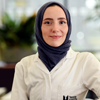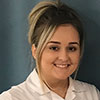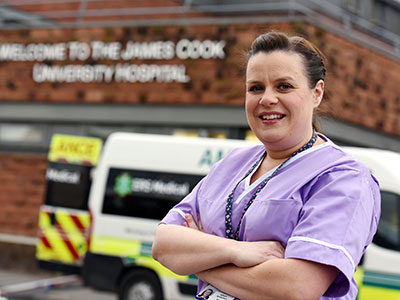Course overview
Health professions day highlights
Earlier this year, we hosted a health professions day for students looking to start their journey into healthcare. They experienced a variety of simulated activities across all of our health courses. Check out the highlights from the day and keep an eye out for the next one.
Supported by midwives and academic staff throughout your training our course balances theory and practice to prepare you with the knowledge, skills and leadership to work as a midwife as an independent practitioner and within the multidisciplinary and agency team.
A midwife leads universal care for women and infants, and is required to make decisions, coordinate, and manage care for women with complex and additional needs in conjunction with the woman and the wider team.
A range of practice placements give you the opportunity to develop your skills as a midwife and put into the practice the theory you have learnt in University. Our trust partners include County Durham and Darlington Foundation Trust, Gateshead Health NHS foundation Trust, North Tees and Hartlepool NHS Foundation Trust and South Tees NHS Foundation Trust.
The course is underpinned by the latest research and will develop your critical analysis skills to deliver care to the highest standard for women.
Top reasons to study this course:
- Nationally recognised: Teesside University is ranked 11th overall and top in the North East for Midwifery in the Guardian University Guide 2025. (51 institutions ranked, tees.ac.uk/source).
- Industry-standard facilities: our state-of-the-art simulation facilities support your practical skills.
- Placement opportunities: we have excellent working partnership with local NHS trusts and charitable organisations plus the opportunity to undertake an elective placement home or abroad.
- Student satisfaction: 100% of midwifery students agreed that staff were good at explaining things (National Student Survey 2024, tees.ac.uk/source).
- Financial support: study this course and you may be eligible for a £5,000 maintenance grant each year from the NHS Business Service Authority. Find out more. You can also apply for our Placement Support Fund if you are experiencing financial difficulties attending your placement. Find out more.
This course prepares you to meet the requirements of the Nursing and Midwifery Council's standards for pre-registration midwifery education (NMC, 2019).Throughout the course, as part of the placement experience, you will be required to travel to your placement area and work a shift pattern rota which includes night duty, weekends and bank holidays.
Supporting information for applicants
Course details
Course structure
Year 1 core modules
Applied Knowledge and Competence in Universal Maternity
Develop your knowledge, communication and clinical competence to assess women’s health and wellbeing, the foetus and neonates during the childbirth continuum. You attend keynote lectures in an interactive learning environment, where you can explore and apply your knowledge to the health assessment process.
Applied Science for Maternity Care
You study a diverse range of life science disciplines and how these apply to the care of women, the foetus and the newborn throughout the antenatal, intrapartum and postnatal period. Explore concepts in life science including anatomy and physiology, biochemistry, immunology, genetics, haematology and pharmacology.
Participate in Holistic Maternity Care
You develop your independence and proficiency in providing safe holistic maternity care. You gain the knowledge and skills to facilitate a better birth experience. Placements are integral to this module and can be streamed to enable flexibility.
Learning takes place primary within the practice area, supported by a team which supervises and facilitates your learning.
Principles of Evidence-based Practice
You are provided with the foundation for lifelong learning, by focusing on how to learn, and beginning the development of critical thinking, reasoning and reflection. Key study skills are also incorporated into this module.
You explore the role of evidence-based practice in the policy context of health and social care. You develop knowledge and skills in formulating questions and literature searching in the evidence-based practice process.
Public Health in Contemporary Maternity Care
You develop an evidence-informed knowledge and understanding of how pregnancy, birth, motherhood and parenting are influenced by the wider social and psychological contexts that women and their families live in. Explore public health, health inequalities, epidemiology and the midwife’s role in influencing the health and wellbeing of women, their babies and families. Examine the midwife’s role in health improvement and partnership working with health and social care professionals and agencies.
Year 2 core modules
Applied Science for Complex Maternity Care
Build on your knowledge of life science disciplines, including the pathophysiology concepts underpinning maternal, foetal and neonatal ill-health assessments. You develop your understanding of care and the disease, aetiology and progression, recognising clinical signs and symptoms of conditions.
Appraising Evidence for Practice
You will further develop skills gained from your first year Principles of Evidence-based Practice to develop a sound theoretical knowledge of the importance of research and the ability to critical appraise and apply this to your clinical learning, and skills delivering evidence-based practice.
Complex Public Health in Contemporary Maternity Care
Gain advanced knowledge and understanding of psychology and sociology relevant to childbearing, midwifery and maternity care. You build further on your knowledge from Year 1, exploring public health issues to put contemporary challenges into context. Develop an understanding of how issues can negatively affect women’s wellbeing, studying the midwife’s role further and working collaboratively to enhance care provision. You also explore the global context of gender inequalities that increase rates of maternal and infant morbidity and mortality.
Develop your professional role in contributing to safe care for women, babies and families with complex needs. Learn how to support a better birth experience, consolidating your midwifery knowledge and skills from Year 1. You spend a lot of time in the practice area, supported by a practice learning team.
Enhanced Maternity Care for Complex Needs
Develop your knowledge and confidence to contribute to caring for women and newborns with complex needs. You build on your care planning and critical thinking skills, applying your knowledge of the relationship between maternal conditions and newborn care. Apply your decision-making skills in a simulated environment.
Year 3 core modules
Leadership and Service Improvement in Maternity Care
You explore a service improvement in the context of health and social care policy, building on the challenges studied in earlier modules. Considering the NHS as a business, examine midwifes’ roles in providing leadership, driving forward innovation, preparing business cases and improving services.
Promoting Excellence in Maternity Care
This dissertation module is delivered across two semesters. You study a challenge to maternity practice, developing your understanding of evidence-based midwifery and practice at local, national and international level. This self-managed project supports your development of skills in retrieving information, critical evaluation and evidence application.
The Proficient Midwife in Holistic Maternity Care
You develop independence and proficiency in providing safe maternity care and a better birth experience. Build on your skills and knowledge from Years 1 and 2 to consolidate your professional role. Learn about caseload holding and continuity of care, developing your leadership, decision making and collaborative working skills.
Transition to Autonomous Practice in Maternity Care
You will develop a wider understanding of midwifery practice from a local, national and international perspective through seminars and an international conference. Your learning, to promote student autonomy, will be enhanced through self-directed learning, seminars and tutorials that involve student-centred learning activities, including deconstructing and discussing critical learning incidents. You will develop knowledge and understanding of learning and teaching theories to facilitate parent education and develop a range of practice experience from case-loading.
Transition to Autonomous Practice in Newborn Care
You will consolidate knowledge and skills delivered during Years 1 and 2 that facilitates transition to autonomous practitioner in the assessment and examination of the newborn. This module will prepare you for post-registration practice with the knowledge and skills to provide the best possible care for the newborn. This will be developed through simulation, clinical examination and decision-making skills and will include the theory component of Newborn Infant Physical Examination (NIPE).
Modules offered may vary.
How you learn
This course is 135 weeks of full-time study, 50% theory and 50% practice, plus 7 week’s annual leave per year. The structure of University theory and practice placement weeks means that it is not possible to take holidays outside of the set dates. Your range of clinical placements take place in the NHS community and acute hospital settings.
A range of teaching and learning strategies develop your confidence and competence in providing care to women, their babies and families within maternity care settings. Examples include practice simulation, interactive lectures, discussion, group work and enquiry-based learning. You are encouraged towards self-directed and independent study, through a number of teaching and learning strategies, including online resources and digital platforms.
The course provides a supportive learning environment and a personal tutor is available to provide pastoral care and development, and academic tutors provide support for academic studies. In practice a practice learning team support, teach and assess your learning.
How you are assessed
Within each academic year there are module assessments for which a pass must be achieved as these are a core requirement. These are varied and include written assignments, exams and presentations. Assessments take place within practice and contribute to a file of evidence to demonstrate development.
Essential competencies that must be met within this course include:
- physical and manual dexterity, as well as observational and auditory skills to undertake holistic health assessment, critical and emergency care for women and their babies
- interpersonal and communication skills
- record keeping and documentation skills
- participation in clinical decision making skills
Our Disability Services team provide an inclusive and empowering learning environment and have specialist staff to support disabled students access any additional tailored resources needed. If you have a specific learning difficulty, mental health condition, autism, sensory impairment, chronic health condition or any other disability please contact a Disability Services as early as possible.
Find out more about our disability services
Find out more about financial support
Find out more about our course related costs
Entry requirements
Entry requirements
You are expected to have:
- a minimum of five GCSEs at grade 4 (C) or above including English language, maths and a science subject. Key Skills/Functional Skills Level 2 in Communication and Application of Number can be accepted in place of English and maths GCSE. You must have English and maths as listed below.*
Plus any of the following qualifications.
GCE and VCE Advanced Level
120 points from three A levels (or equivalent T levels) including a science subject, preferably biology. We will accept psychology and physical education. AS level is not acceptable.
Access Course
120 UCAS points from a QAA recognised Access course (any combination) in a science or health subject (including a science unit, preferably biology)
*We can accept 6 Units at graded Level 2 in English and 6 Units at graded Level 2 in maths or 3 credits at Level 3 in maths and 3 credits at Level 3 in English in the absence of GCSEs in these subjects
BTEC QCF Extended Diploma
120 points (DDM) in a science or health subject.
CACHE Level 3 Extended Diploma
120 points (B) In health & social care
Irish Leaving Certificate
120 points from four or five Highers/Honours subjects including a science, preferably biology.
Scottish Highers
120 points from four or five Highers including a science subject, preferably biology.
Advanced Scottish Highers
3 Advanced Highers including a science subject, preferably biology.
Or
Foundation degree
A pass in a science or health subject.
The selection process includes shortlisting of your application, following which, if successful you will be invited for an interview.
Your personal statement
Your personal statement is an important part of your application
It is your opportunity to tell us why you want to study midwifery Teesside. It is key to you being invited for an interview.
What to include
The midwifery team are keen to know what you understand to be the role of the midwife and what motivates you to study midwifery. You will be or have recently studied subjects to prepare you for the course, and we are interested to understand how you think your studies have prepared you the midwifery degree. You will have life experiences and transferrable skills that may include, voluntary work, part time work, hobbies, tell us what they are, and how they relate to the NHS core values and behaviours. Please note we do not require you to have voluntary experience, it is your transferable skills that we are interested in.
The midwifery course involves clinical placements and theoretical work in University so you will need to be organised and resilient, you could include examples of how you have demonstrated organisation and resilience skills in the past.
Where can I get more information?
You can access a range of healthcare websites, books and journals about midwifery, use this information to demonstrate you really know what the role of a the midwife involves.
Shortlisting criteria
Your application will be measured against the following criteria:
- your ability to complete all sections of the application form fully and correctly
- the level of all qualifications and grades are specified
- appropriate academic entry requirements achieved or predicted
- personal statement supportive of the chosen course which demonstrates an understanding of the uniqueness of the profession and the midwife's role
- satisfactory references.
If you are invited to interview and the date becomes unsuitable for you, we may not always be able to offer you an alternative date due to the high volume of applications received for this course. Please contact the admissions department for further information if required.
Interview criteria
At the online or face to face interview, you will be asked 6 questions which are mapped against the NHS Constitution:
- privacy & dignity
- resilience & reflective ability
- problem solving
- advocacy & empowerment
- honesty & integrity
- team working
A range of scenarios will be used to enable you to demonstrate your ability to address the NHS constitutional values alongside communication skills based on your performance throughout the workstations.
If you are successful in both shortlisting and interview you will receive an offer which is subject to the following:
- evidence of achievement of the required academic qualifications
- a successful work-based risk assessment which will reflect the appropriate HEOPS recommendations. Find out more about all of the HEOPS standards
- an enhanced criminal history (DBS) check will be required as you will be working within clinical trusts which involve working with children and/or adults at risk. The DBS check is funded by the School of Health & Life Sciences so you do not need to pay for this process.
- satisfactory references.
Please note until 1 to 4 have been successfully completed the offer of a place on the course remains conditional.
International applicants
- International applicants must have a minimum IELTS score of 6.5 in writing alongside a minimal of 7.0 in reading, listening and speaking with a minimal overall score of 7.0 before an unconditional offer is made
- If you are successful at shortlisting you will be invited to attend an interview (which may be in person OR video call) in one of our international offices in either India, Malaysia or China, or through a secure web link (which will be arranged by the University).
- If you are unable to attend an interview as stated, you will be unable to proceed with your application.
For international enquiries please email internationalenquiries@tees.ac.uk
For general information please see our overview of entry requirements
International applicants can find out what qualifications they need by visiting Your Country
Employability
Career opportunities
The knowledge and experience gained during the course provides you with the opportunity to have an exciting and rewarding career. Registered Midwife status is recognised internationally and career opportunities are available both at home and abroad. New posts, roles and responsibilities are constantly evolving, both in community and hospital settings.
Information for international applicants
Qualifications
International applicants - find out what qualifications you need by selecting your country below.
Select your country:
Useful information
Visit our international pages for useful information for non-UK students and applicants.

 BSc (Hons) Midwifery
BSc (Hons) Midwifery BSc (Hons) Midwifery
BSc (Hons) Midwifery BSc (Hons) Midwifery
BSc (Hons) Midwifery
